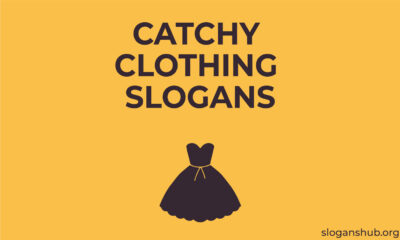Business Slogans
Importance of Slogans in Branding for Small Business
Slogans are important yet powerful expressions of a brand’s identity and values. They serve as memorable taglines that encapsulate a brand’s essence and resonate with consumers deeply. In this article, we will discuss the importance of slogans in branding and explore their role in shaping consumer perceptions, enhancing brand recognition, and driving engagement.
What is a slogan?
A slogan is a short and memorable phrase that captures the essence of a brand, product, or idea. It is a powerful tool in branding and marketing campaigns, acting as a verbal shorthand for communicating key messages to consumers.
Often referred to as taglines or mottos, slogans are designed to evoke specific emotions, convey brand values, and differentiate a product or service from its competitors.
Role of Slogans in Branding
Slogans are important in branding strategies. They are more than catchy phrases. They are instrumental in enhancing brand recall and memorability, ensuring that a brand remains top-of-mind for consumers.
By mixing complex brand messages into concise and memorable statements, slogans facilitate instant recognition and recall in consumers’ minds. Moreover, they serve as a vehicle for communicating brand values and personality, allowing brands to establish emotional connections with their target audience.
You might be interested in Common Mistakes to Avoid in Slogan Writing
Impact on Consumer Perception
The significance of slogans extends beyond mere memorability; they wield considerable influence over consumer perceptions. A well-crafted slogan can evoke emotions, instill trust, and shape consumer attitudes towards a brand. Through strategic messaging and positioning, slogans can differentiate a brand from its competitors and foster a sense of loyalty among consumers. By aligning with consumer values and aspirations, slogans can sway purchasing decisions and drive brand preference.
Slogans and Brand Recognition
Consistency is key to building brand recognition through slogans. A cohesive branding strategy integrating slogans across various marketing channels reinforces brand identity and messaging. When coupled with visual elements such as logos and imagery, slogans create a unified brand experience that resonates with consumers. Successful branding campaigns often leverage memorable slogans to leave a lasting impression and establish a strong brand presence in the market.
You might be interested in How to Come Up with a Catchy Business Name 20 Easy Steps
How to Create Effective Slogans
An effective slogan requires a deep understanding of the target audience and market positioning. By conducting thorough audience research and competitor analysis, brands can identify unique selling points and craft slogans that resonate with their target demographic. Moreover, incorporating relevant keywords into slogans can enhance their visibility in search engine results, contributing to SEO optimization. Through iterative testing and refinement, brands can fine-tune their slogans to maximize impact and effectiveness.
Case Studies
Examining real-world examples of successful branding campaigns provides valuable insights into the power of slogans. Brands such as Nike (“Just Do It”) and McDonald’s (“I’m Lovin’ It”) have achieved iconic status through their memorable slogans, which have become synonymous with their respective brand identities. Conversely, failed slogan attempts highlight the importance of careful consideration and testing in slogan development.
Future Trends in Slogan Usage
As the branding landscape continues to evolve, so will the role of slogans. With the rise of digital marketing and social media, brands increasingly leverage slogans to engage with consumers across various online platforms. Personalization and localization are emerging trends in slogan usage as brands seek to tailor their messaging to specific audiences and cultural contexts. Anticipating shifts in consumer preferences and behaviors will be crucial for brands looking to stay ahead of the curve in slogan development.
Check out this detailed guide on How to Write a Slogan for Your School
What’s the difference between a slogan and a tagline?
While the terms are often used interchangeably, a slogan is typically associated with branding and marketing campaigns, serving as a concise and memorable expression of a brand’s identity or message.
On the other hand, a tagline is a specific type of slogan that is more focused on positioning a product or service in the market, often appearing alongside a brand name or logo to reinforce its key attributes or benefits.
In essence, all taglines can be considered slogans, but not all slogans are necessarily taglines.
Do’s and don’ts of using a slogan
Do’s of Using a Slogan:
- Ensure Alignment: Ensure the slogan aligns with the brand’s values, message, and positioning.
- Keep it Concise: Keep the slogan short, memorable, and easy to understand.
- Reinforce Brand Identity: Use the slogan to reinforce and differentiate the brand from competitors.
- Integrate Seamlessly: Integrate the slogan seamlessly with the logo design for a cohesive brand identity.
- Test for Effectiveness: Test the slogan with the logo to ensure it resonates with the target audience and enhances brand recognition.
Don’ts of Using a Slogan:
- Overcomplicate: Avoid overly complex or ambiguous language in the slogan that may confuse or alienate consumers.
- Clash with Logo Design: Avoid using a slogan that clashes with the logo’s visual elements, detracting from its impact.
- Lack of Relevance: Avoid using a slogan that is irrelevant to the brand or its products/services.
- Be Too Generic: Avoid using generic or clichéd slogans that fail to differentiate the brand or resonate with consumers.
- Ignore Feedback: Avoid ignoring feedback from stakeholders or consumers regarding the effectiveness of the slogan-logo combination.
The importance of slogans in branding cannot be overstated. From enhancing brand recall and recognition to shaping consumer perceptions and driving engagement, slogans play a vital role in the success of a brand’s marketing efforts.
Brands can ensure that their slogans resonate with their target audience while optimizing their visibility in search engine results. As the branding landscape continues to evolve, brands must remain adaptable and innovative in their approach to slogan usage, staying attuned to emerging trends and consumer preferences.

-

 Business Slogans2 years ago
Business Slogans2 years ago199 Catchy Clothing Slogans Ideas, Clothing Taglines for Business
-

 Business Slogans2 years ago
Business Slogans2 years ago111 Catchy Fashion Slogan Ideas & Fashion Taglines 2024
-

 Business Slogans2 years ago
Business Slogans2 years ago150 Good Anti Drug Slogans to Spread Awareness Agains Drugs
-

 Business Slogans2 years ago
Business Slogans2 years ago300 Holistic Health Slogans | Best Health Taglines & Health Phrase